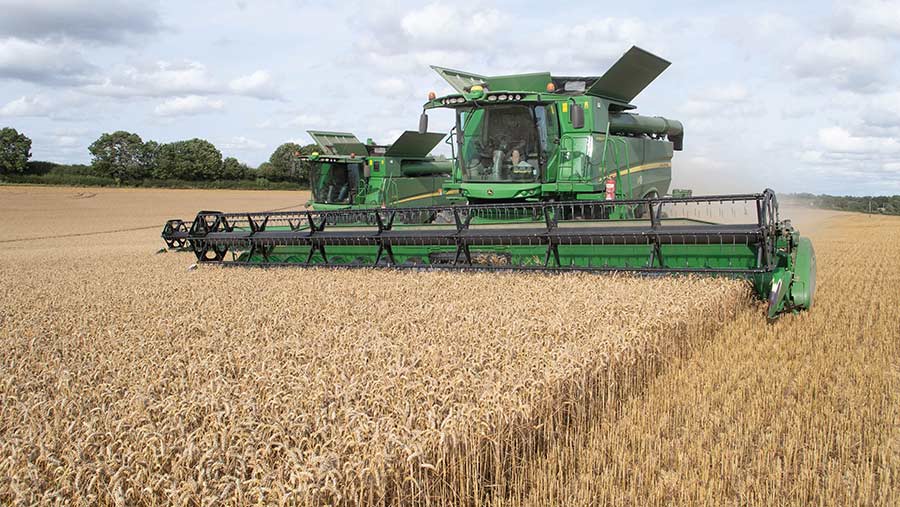Milling premiums strengthen on variable wheat quality
 © Tim Scrivener
© Tim Scrivener Milling wheat premiums are rising on quality and supply concerns both at home and in countries from which the UK imports supplies.
Premiums have been creeping up by about £1/t a week over the past few weeks, and on Wednesday (1 September) varied between £20/t and £26/t over feed wheat for September movement of full spec breadmaking samples.
Andrew Hill, grain origination leader at Frontier Agriculture, described the UK crop as usable but not vintage.
On samples seen so far, quality appears poorest in the South East and south of the M4, slightly better in East Anglia and much better in the East Midlands, he said.
See also: Farm businesses warned of holiday pay time-bomb
With some shorts in the market, a premium of up to £30/t is achievable for September-October supplies at buyer’s call, said Mr Hill, with millers keen to use new crop.
Low bushel weights are a feature of the 2021 harvest and proteins are generally lower than 13%, so the market for full spec material should be strong, according to Mr Hill.
With the harvest up to three weeks behind average dates in some areas, not enough samples have been seen by mills for the market to settle established premium levels. There are frequent reports of ergot, although this varies regionally.
UK milling wheat market
- UK flour millers use between 5m and 7m tonnes of wheat a year – the sector is the largest single processor of British wheat
- In 2019-20, the proportion of home-grown wheat used by flour millers was 87%, equalling the previous all-time high of 2011
- The proportion of home-grown wheat used from the smaller 2020 harvest is estimated at 76%
- About 15% of millers’ requirements is imported – roughly 750,000t
- Imports come mainly from Germany, France, the US and Canada
However, with imported German wheat priced at about £40/t above that for UK grain, millers will be trying to use as much home-grown grain as possible
It remains be seen how premiums develop for what is expected to be a large quantity of usable milling wheat, but which fails to make the top spec.
Feed wheat values midweek averaged £183/t ex-farm for September, up about £2/t on the week, with futures on a rising trend since mid-July and at £194/t for November 2021.
Delivered prices collected by AHDB show the full spec breadmaking premium over feed wheat in the week to 26 August rising by between £6/t and £7.50/t on the week in the North West, East Anglia, London and Northamptonshire destinations.
This compares with a rise in delivered feed wheat prices of up to £4/t in the same week.
Breadmaking samples ranged from £219.50/t to £232.50/t delivered for September, with the highest prices in the North West.
The UK imports up to 500,000t of breadmaking wheat from Canada each year.
The government agency Statistics Canada released a crop report early this week, which estimated the country’s wheat crop will fall to 22.9m tonnes this year – a drop of almost 35% on the 2020 harvest.
Alexander Waugh, director-general of trade body UK Flour Millers, was hopeful that the UK’s import requirement for top-quality wheat could still be met from the smaller Canadian crop, although it would cost more.
Germany and France, both key import origins for UK wheat supply, have seen harvest delays this year. Initial indications of wheat quality in both countries suggest low specific weights, said AHDB Cereals and Oilseeds.
As a result of quality concerns and diminishing global supply, Paris milling wheat futures have jumped since early July, helping support UK feed wheat futures.
Barley
Strong domestic demand is supporting feed barley values and narrowing the discount to feed wheat.
